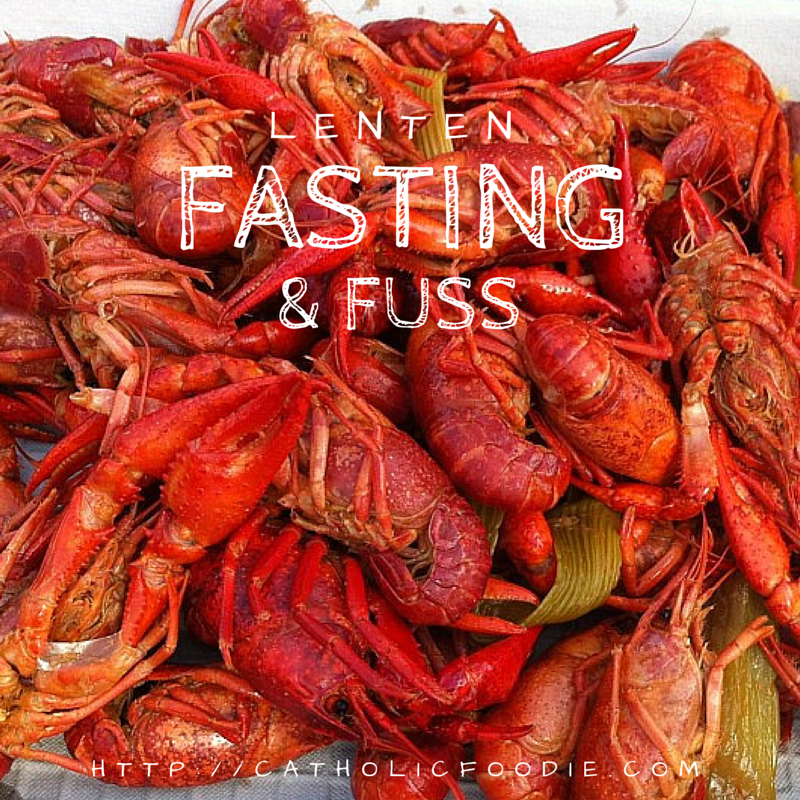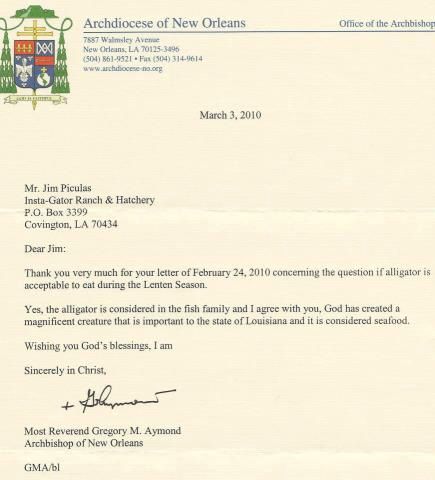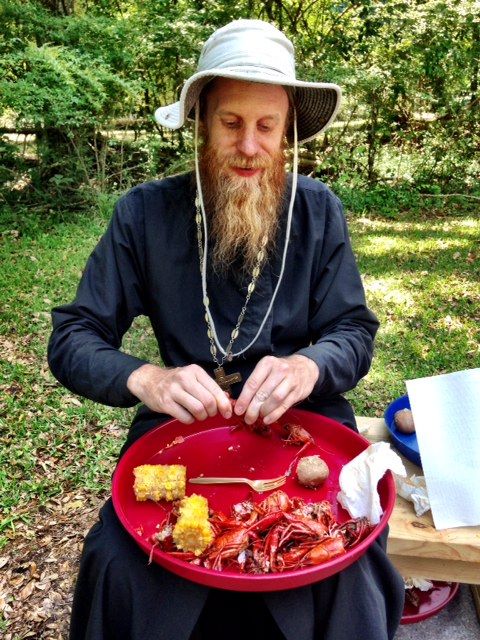Lenten Fasting and Fuss

We catholics of the 21st century have it easy. Especially here in south Louisiana where fresh seafood is plentiful.
But it used to not be that way.
Today, for Roman Catholics, there are only two official fast days in the liturgical year: Ash Wednesday and Good Friday. In years (and centuries!) past, that was not the case. There were official days of fasting and abstinence prescribed throughout the year:
- the beginning of Advent and the Vigil of Christmas
- Ash Wednesday, Good Friday, and ALL Fridays in Lent
- the Vigil of Pentecost
- and before the Feast of St. Michael
All Fridays throughout the year (unless usurped by a first class feast day or solemnity) were days of abstinence and penance.
But today there are only two fast days, and we catholics are required to abstain from meat only on Fridays in Lent. The US Bishops encourage abstinence on all Fridays throughout the year, but it is not required.
Fasting & Abstinence: A Tricky Business
Abstinence from meat can be a bit tricky, especially for those of us who reside so close to the Gulf of Mexico that provides us with an abundance of fresh seafood.
I remember Lent when I was growing up as a child in Baton Rouge. Fridays in Lent meant fish sticks for lunch and fried shrimp or fried catfish for dinner… with a healthy serving of ketchup at both meals. Later, as an older teenager trying to take my faith (and live it!) seriously, I was scandalized by what appeared to me to be a Lenten “seafood gluttony” endorsed by the Church. The Friday night fish frys in parishes peppered throughout the city didn’t seem very penitential to me.
It’s only as I grew older that I began to appreciate the communal – family – element of those fish frys, and began to see the bigger picture, including the charitable works that are funded with proceeds from those parish events.
Still, I think that my young ideal self was on to something.
Pope Francis recently cautioned all of us not to turn our Lenten observance of abstinence into an occasion of gluttony. He said that real fasting isn’t just about restricting food choices… abstinence isn’t just about not eating meat on Fridays. Real fasting and abstinence must also include cleansing the heart of all selfishness and making room in one’s life for those in need and those who have sinned and need healing.
Lent, Pope Francis said, isn’t about formal observance. We are called to go beyond formal observance to the heart. “It is not a good Christian who doesn’t do justice to the people who depend on him” and who does not “deprive himself of something essential for him in order to give it to another who is in need.”
“This is the distinction between formal and real,” Pope Francis said, which Jesus underlined, too, when he condemned the Pharisees and doctors of the law, who adhered to “many external observances but without the truth of the heart.”
We need to feel our penance.
When asked how much someone should give when it comes to charity, Blessed Mother Teresa of Calcutta used to respond, “Give until it hurts.” We need to feel our penance.
And today, in my humble opinion, it can be quite difficult for us catholics, especially in the United States, to feel our penance.
Not the Case with All Catholics
This isn’t necessarily the case with all catholics. Look at the 24 Eastern Catholic Churches in union with Rome. Though there is some variation from church to church, each Eastern Catholic Church (Byzantine, Maronite, Melkite, etc.) tends to follow – in practice – the traditions of the Orthodox Churches when it comes to fasting. And the orthodox take a much stricter approach than we catholics.
As an example, here are the stipulations for the lenten observance of Byzantine Catholics in the United States (courtesy of Epiphany Byzantine Catholic Church):
Abstinence: The law of simple abstinence forbids the use of meat, permitting the use of eggs and dairy products. All the faithful who receive the Eucharist are bound to abstain. Abstinence is obligatory on all Wednesdays and Fridays of the Great Fast.
Strict Abstinence: The law of strict abstinence (fast) forbids the use of meat, eggs and dairy products. While they are permitted, facsimiles, substitutes, and synthetic derivatives violate the intention and spirit of the law of strict abstinence. All the faithful who receive the Eucharist are bound to observe strict abstinence. Strict abstinence (fast) is to be observed on Pure Monday, the first day of the Great Fast and on Great and Holy Friday.
Not the Case with the Orthodox
I don’t know many orthodox folks personally, except for my friend Fr. Peter Preble, an Orthodox priest in Massachusetts, who hosts a podcast called Shepherd of Souls, which is aired on Ancient Faith Radio. I also know a few other orthodox folks, mainly through my participation in the annual Greek Festival in New Orleans. I do, however, have a deep respect for the orthodox, and I long for the reunion of the Eastern and Western Church. This is one of the reasons that my family and I participate every year in the New Orleans Greek Festival hosted by Holy Trinity Greek Orthodox Cathedral in New Orleans.
From what I hear from folks, and from what I read, the Orthodox Church takes fasting and abstinence much more seriously that we Roman Catholics.
Just the other day I came across and article by Rod Dreher called Lent in Orthodixie. The article highlighted, in a lighthearted way, the differences in fasting between the catholics and orthodox. I found it interesting because Rod is a convert to Orthodoxy. He grew up Roman Catholic.
In the article, Rod references two things dealing with catholics and fasting in the south that I have covered here before at CatholicFoodie.com: alligator and crawfish. Let’s talk first about the alligator.
The Archbishop & the Alligator: Fasting from the Heart

In his response, Archbishop Aymond wrote, “Yes,” clarifying the “status” of the alligator, at least as it pertains to Lent. “…[T]he alligator is considered in the fish family… and it is considered seafood.”
The archbishop received some flack for that letter, and each Lent since then it seems that the news stories circulate again about the “alligator and the archbishop.” But what most of those news stories miss is what I heard the archbishop say in a news interview a couple of years after that letter was written. He said that it really isn’t a question of what is permissible. It’s a question of the heart. Our sacrifice should spur us to love. Just like the US Bishops only encouraging abstinence on all Fridays of the year instead of requiring it. The bishops are really holding us to a higher standard… the standard of love.
Boiling Crawfish on Good Friday?

Rod Dreher also brought up crawfish, noting that they are indeed permitted on Fridays in Lent. However, he failed to mention that the question isn’t really about what is permissible.
Over the last few years, I have noticed both Archbishop Aymond and a number of priests in the Archdiocese of New Orleans becoming more vocal on the tradition of families having crawfish boils on Good Friday, pointing out that a crawfish boil is more appropriate for Easter Sunday.
Although technically permissible, it can be argued that a crawfish boil on Good Friday misses the mark when it comes to the spirit of fasting.
Lent and crawfish season do indeed overlap every year, and Fridays in Lent find lines of people at seafood markets all across south Louisiana.
As a matter of fact, Good Friday – one of the only two days of fasting in the Church year – is the biggest day for crawfish in New Orleans.
A crawfish boil isn’t just a meal. It’s an event. It’s a party. On a day of fasting, Good Friday, it just seems out of place. Yes, technically fasting consists of one full meal in a day and two smaller meals not to equal that one full meal. Still… Even if you ate nothing else the rest of the day, it is difficult to image a crawfish boil qualifying as fasting. It misses the mark. It lacks the spirit.
But a crawfish boil perfect for Easter Sunday. And that’s how my family and I have been celebrating Easter Sunday for years.
How Do You Fast?
So what about you? How do you fast, particularly on Good Friday? Please share with me and my readers. Leave a comment below.